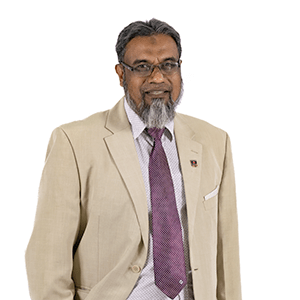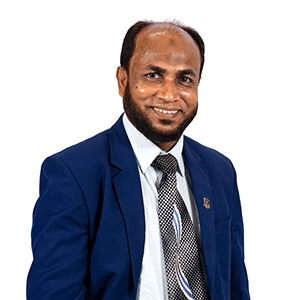Office of the Proctor
The Office of the Proctor plays a pivotal role in upholding academic integrity, discipline, and excellence within the campus. Owing to its unwavering commitment to sustaining ethical standards, our office is critical in fostering an atmosphere favourable for intellectual development and individual progress.
Priority number one among our goals is the safeguarding of academic integrity. Our institution maintains an unwavering dedication to upholding principles of integrity and equity in every academic undertaking, thus protecting the standing and credibility of Uttara University. Employing diligent supervision and proactive strategies, our objective is to foster an environment devoid of academic dishonesty and conducive to the flourishing of meritocracy.
A set of fundamental obligations with the purpose of cultivating a campus community that is amicable and considerate is intrinsic to our mission. This involves diligently supervising the administration of examinations in order to prevent any form of academic dishonesty and to guarantee an equitable environment for every student. Furthermore, it is the responsibility of the Office of the Proctor to ensure compliance with disciplinary regulations, thereby fostering a secure and all-encompassing atmosphere that appreciates and safeguards each individual.
Beyond our regulatory responsibilities, we provide assistance and direction to students encountering academic obstacles, advocating for their overall success and welfare. By furnishing individuals with mentorship and resources, we enable them to surmount challenges and achieve their utmost capabilities.
As guardians of scholarly integrity, the Office of the Proctor maintains an unwavering commitment to the fundamental values of integrity, equity, and responsibility. As custodians of the principles that delineate Uttara University, our primary objective is to maintain its prestigious standing and furnish every individual within our community with the necessary resources to succeed.
Uttara University Students' Code of Conduct, 2024
1. Preamble
Uttara University (UU) is committed to promoting a safe and congenial learning atmosphere to ensure academic integrity and campus civility through enforcing students’ discipline. UU recognises all peaceful and non-obstructive forms of dissent (individual and collective) expression and behaviour, which do not interfere with the regular and essential academic/non-academic operations of the university. The university is also committed to constructive debate of alternative views. At the same time, the University assures that the students who are alleged to be responsible for unacceptable conduct receive a fair and impartial.
2. Objectives
The objectives of the University’s Code of Conduct are:
- to ensure an environment of peace and civility, a precondition for the pursuit of higher learning in a university
- to maintain the said environment, to keep the University free from indiscipline, disorder and violence
3. Types of Offences/Misconduct
a. Any conduct which constitutes a criminal offence;
b. Any conduct which constitutes sexual misconduct;
c. Disruption of and interference with the academic, administrative, sporting, social or other activities of the University;
d. Obstruction of and interference with the functions, duties or activities of any student, any faculty/staff member of the University, or any visitor to the University;
e. Violent, indecent, disorderly, threatening, intimidating or offensive behaviour or language, whether expressed verbally or in writing, including online behaviour in electronic media;
f. Bullying, harassment or unacceptable behaviour perpetrated to any student, any faculty/staff member of the University, or any visitor to the University on the grounds of sex, race, caste, religion, belief, disability, sexual orientation, age or other grounds, including online bullying and harassment;
g. Fraud, deceit, deception or dishonesty in relation to the University or its staff, students or visitors;
h. Cheating or plagiarism in academic course work or in examinations;
i. Theft, misappropriation or misuse of the University property, or the property of the University’s teachers, staff, students or visitors, including computer misuse or any other unauthorised use of any instrument;
j. Misuse or unauthorised use of the University premises;
k. Damage to University property, or the property of the University’s teachers, staff, students or visitors;
l. Action likely to cause injury or impair safety on the University premises, at the University’s organised events or on any other site associated with the University;
m. Failure to respect the rights of others to freedom of belief, freedom of speech and reputation;
n. Breach of the provisions of any University code, rule or regulation, including any student code of conduct;
o. Failure to disclose personal details to a member of staff of the University in circumstances in which it is reasonable to require that such information be given;
p. Failure to comply with a reasonable instruction relating to discipline, issued by the concerned Disciplinary decision-maker.
4. Definitions
Unless the context otherwise requires, definitions of misconduct or violation of Code of Conduct are given below:
4.1. Offences related to Academic Matters
Academic Dishonesty/ Plagiarism - Academic dishonesty includes things like cheating, passing off someone else's work as your own, getting work ready to be used for someone else's work, and knowingly giving a university official misleading information about academic matters. Using someone else's words, ideas, concepts, pictures, or other intellectual property in general without giving due credit to the original author is known as plagiarism.
4.2. Offences related to Behavior, Conduct, Decency and Morals
4.2.1. Disobedience — Disobedience includes, but is not limited to, disobedience, interference, resistance or failure to comply with direction given by various Departments or University authority. Trespassing and other forms of unauthorised presence, refusing to show the identity card to the University’s officers, security personnel or faculty member on demand and not complying with the University parking rules.
4.2.2. Disorder/ Agitation - An act of disorder or agitation is the incitement of rioting, the use of force or coercion, organising meetings/ procession/ demonstrations intended to solicit support or obtain signatures to show support or compel any member of the University to participate in activities subversive of discipline or the functioning of the University.
4.2.3. Disorderly Behavior - Any breach of the University rules, regulations or policies is an act of disorderly behaviour.
4.2.4. Disruption - Disruption is an act or a combination of actions by an individual or a group of individuals that interferes with the smooth and regular functioning of the University.
4.2.5. Indecent Behaviour - Any behaviour or expression intended to tease or annoy members of the opposite sex or the use of otherwise improper words, gestures, clothing or acts is indecent behaviour.
4.2.6. Intolerance - All members of the University are expected to treat others with tolerance and respect, regardless of their colour, religion, class, gender, creed, or standing within the university or the larger community. An act of intolerance is any attitude or behaviour on the part of an individual or group of individuals that does not exhibit such tolerance, respect, or decency toward others.
4.2.7. Unseemly Conduct - Unseemly conduct includes any act of offensive behaviour as well as the use of improper or vulgar expressions or language when interacting with faculty members, university officials or staff, or others on campus.
4.2.8. Undesirable Behaviour - A behaviour on or off the campus that tarnishes the image of the University or disrupts functioning of its normal activities or any kind of association with groups and/or individuals that is prohibited by the government, against the law of the country and detrimental to local, national and/or global peace and security is an act of undesirable behaviour. University authority reserves the right to expel those students permanently and to some extent hand them over to law enforcement agencies. Propagating any form of hate message on campus, over social media or any other means that deliberately demean different religions, cultures or ethnic groups which are punishable offences by the law of our country. Any form of message, image, drawing, social media post or any other type of communication that directly or indirectly instigates or supports extremism/terrorism, acts of terrorism or activities that lead to extremism and are against the security and sovereignty of the country, will result in disciplinary action by the university authority. University authority reserves the right to expel those students permanently and to some extent hand them over to law enforcement agencies.
4.2.9. Indecent behaviour, indecent exposure, obscene, indecent, aggressive and/or offensive language, and acts of cruelty –
- (a) Indecent behaviour — Indecent behaviour is defined as indulging in any sexually motivated behaviour or publicly displaying affection on the university campus in a way that is against the moral standards of the community, other accepted behaviour standards, or customs of decency;
- (b) Indecent exposure — Deliberately exposing one's innerwear or parts of one’s body in public when doing so goes against societal norms regarding appropriate behaviour, morality, or general decency is known as indecent exposure;
- (c) Obscene, indecent, aggressive and/or offensive language – Using derogatory, offensive, hostile, and/or aggressive language or images to incite fear in other members of the university community through verbal or written communication, insults or suggestive posts, trolling, stalking, cyberbullying, etc.;
- (d) Cruel Behaviour – Treating people with cruelty that is contrary to the local, moral or other standard of appropriate behaviour that is generally accepted.
4.3. Cyber-Crime
Cyber-crime includes, inter alia, misconduct and offences such as fraud, cheating, identity theft, harassment, pornography, subversive activities, indecent behaviour, software and media piracy, website defacement/vandalism, release of viruses or worms, spam, advertising, spying, hacking, and cyberbullying that are carried out via email, blogs, social networking sites, Uttara University network or Uttara University Web Portal, or mobile phones.
4.3.1 Cyber-Defamation: Uttara University, we recognize the importance of responsible digital conduct and require all students to refrain from any form of cyber-defamation. Cyber defamation can be described as the process where one makes or shares damaging statements about another person, group and or institution on the cyberspace. Cyber Defamation is defaming someone by harming their public image and reputation in the digital space. It typically involves the bully(ies) posting or commenting persistent destructive criticism of the victim online, on publicly accessible platforms such as social media, to create a negative, false perception of the victim in front of their contacts. It includes, but is not limited to, online trolling, social media stalking and harassment, unauthorized AI deep fakes, posting false, misleading information about the victim, circulating the victim's photo or name in offensive memes, defamatory hashtags or campaigns etc.
4.4. Offences Related to Property, Documents, Records, etc.
4.4.1. Damage of Property — Property damage includes acts such as vandalism, arson, deliberate actions, and careless conduct that result in the destruction or harm of university or third-party property.
4.4.2. Copyright Infringement — The official property of Uttara University includes, among others, publications, audio-visual productions, logos, and other media materials. All student creations made for courses offered, including uncut videos, are also regarded as university property. Without express permission, no one may use the logo, picture, video, or other media content belonging to the university.
4.4.3. Mischief — Tampering with or unauthorized use of any university equipment or other property, such as doors, locks, computers, telephones, lifts, projectors, etc., is an act of mischief.
4.4.4. Theft — Misappropriation or removal of university property or the property of others without any lawful authority is an act of theft.
4.4.5. Fraud/Deception — Providing false information with the intention of benefiting from the fabrication of documents, records, etc., is an act of fraud. Fraud includes: reporting a false emergency on purpose; misusing or fabricating university or related papers by forgery, alteration, or inappropriate transfer; and providing false information to a university official, knowing that it is false.
4.4.6. Misuse of ID — An ID card is the property of Uttara University. A student is not permitted to voluntarily lend his or her ID to another person for any reason. If students lend their ID to another, both the original owner and the recipient will face disciplinary action.
4.5. Offences related to Health, Human Body and Safety
4.5.1. Smoking - The University is a smoke-free environment. All members of the campus community are expected to refrain from smoking. Smoking is forbidden in all indoor and outdoor locations of the University.
4.5.2. Drugs - The use, production, distribution, sale, possession or stashing of drugs in a manner prohibited under law is an offence. This includes, but is not limited to, alcohol, marijuana, stimulants, narcotics, yaba and crystal meth, and the abuse of prescribed medications.
4.5.3. Violence / Physical Abuse - Physical abuse is any act of violence, including beating, kicking, and unwanted physical contact, committed by any student or their agent(s).
4.5.4. Weapons related - It is strictly prohibited to carry, use, or stash any kind of weaponry on campus, including clubs, knives, explosives, harmful chemicals, and firearms.
4.6. Subversive Activities
Subversive activity includes, but is not limited to, any act, behaviour, or speech that is regarded as a threat to the public, national security, or sovereignty of Bangladesh or any other nation.
4.7. Sexual Harassment/ Eve Teasing
Sexual harassment is defined as conduct that is inappropriate, undesired, and unwelcome, or behavior of a sexual nature that is perceived as harassment by the recipient and which has an adverse impact on the dignity of men and women both within and occasionally outside of the University. Please refer to the Uttara University Sexual Harassment Policy in the Appendices for further information.
4.8. Ragging and Bullying
Ragging/Bullying can include: intimidation, humiliation, ridicule or offence; physical threats; exercise of power over another through negative behaviour; insulting, abusing, disparaging or intimidating behaviour or words. Cyber Bullying is “the use of electronic communication to bully a person.” It falls under this policy if the bullying is between students, staff or faculty members and occurs on the university premises or adversely affects the safety of students, staff or faculty members while at the university.
4.9. Classroom Discipline
Students are expected to maintain respectful and decorous behaviour towards students, staff, and faculty while in the classroom and on the university premises. Ill-discipline includes: interrupting learning through talking out of place, use of mobile phones, lateness to class, or rude words or behaviour, etc. It also includes loud talking or disruptive behaviour in the hallways during classes and exams.
4.10. Unlawful Obstruction
Any interference or obstruction intended to restrict someone's freedom of movement on campus is unlawful obstruction. Any intention or attempt to prevent someone from moving to or from any university activities also falls within unlawful obstruction.
4.11. Unauthorised Recording
Recording, storing, sharing or distributing of images, videos or sound by any means without consent is unauthorised recording and is strictly prohibited at the University.
4.12. Political/Non-Political Group Representation
Uttara University has a strict policy of non-association and non-involvement in political activities inside the campus and university students’ dormitories. Whatever political views that an individual(s) may have, he/she shall not practise them in the campus or class or within 50 yards of the boundary of the campus premises. No student can use the name of this university with any political party. Group representation–verbal, in writing or any other form of expression–is strictly forbidden and is considered an act of agitation. Offenders on account of agitation are liable to one or a combination of severe sanctions. The Authority shall have the right to expel students not complying with this rule. For any non-political activity, written permission must be taken from the Disciplinary Committee.
4.13. False/Frivolous Complaints
Making a complaint to the University authority in an attempt to mislead, misuse, or impede university protocols is a false or frivolous complaint.
4.14. Other Offencess
- (a) Walking, gathering or roaming in the University premises without justified causes at night after the office or during holidays/ vacation;
- (b) Any other such acts which disturb the normalcy or peace of the campus;
- (c) Any act of indiscipline or disturbances in various activities of the University or any function, ceremony, etc., being held in the campus;
- (d) Making false allegations, character assassinations of teachers, officers and employees.
- (e) Any other act or omission to be deemed as improper by the authority concerned.
4.15. Further Regulations
4.15.1. Campus Security
Security of UU students, faculty, staff, and physical property is of utmost importance. Students are required to follow instructions of security, administrative staff of faculty members in all matters concerning security of the above. Failure to do so will be considered disruption. Students may be asked to submit to a search of their person or possessions while on campus. Failure to submit will be considered disruption or disobedience.
4.15.2. Proper Use of Student IDs
Students are required to wear their own IDs at all times when on campus. Students may not enter campus or use any facilities for any reason without possessing and wearing their IDs. It is solely the student's responsibility to maintain possession and care of the ID at all times.
- (a) Loss or Theft ID: Loss or theft of an ID must be reported to the Administration immediately. A fee must be paid to replace it. The ID will be replaced within a suitable time upon receipt of payment.
- (b) Forgotten IDs: If a student forgets an ID, they may be issued a temporary ID only upon payment of a fine.
- (c) Sharing ID: Students may not lend or share IDs with other persons for any reason. Lending one's ID to another will result in disciplinary action for both the original student and the recipient.
- (d) Unauthorised use of ID: If you are not a registered student of the university for a particular term or if you are barred from entering the campus for disciplinary reasons then do not use your ID card even if it works with machines at the entrances of campus. You must take special permission from the authorities to enter the university.
5. Authorities
The Proctorial Body, Eve Teasing and Sexual Harassment Prevention Committee, Anti-Drug Awareness Committee and Anti-Drug Committee shall monitor their respective matters under the Disciplinary Committee. The Proctorial body shall work closely with other authorities in disciplinary matter.
5.1. Disciplinary Committee - There shall be a Disciplinary committee comprising one person as Chairman from the Board of Trustee, the Vice-Chancellor, Deans from all Schools, one of the Chairperson of Departments as nominated by the Syndicate and the Registrar. They shall be the members of such committee, while the Proctor shall remain as the member secretary of this committee.
5.2. Authority of Proctor's Office - The role of the Proctors is to ensure the enforcement of the rules and regulations of the including Code of Conduct. The Proctor’s Office is the first contact point to start disciplinary proceedings. It will assess and investigate complaints, and take necessary steps, from counselling or issuing an official warning to referring the case to the Disciplinary Committee, depending on the gravity of the offences and as per the advice of the Vice-Chancellor. The proctorial body shall consist of the Proctor and Assistant Proctors as deemed necessary by the University authority. The Proctor and the Assistant Proctors shall be directly responsible to the Vice Chancellor.
5.3 Responsibility of the Proctorial body may include:
- (a) Maintaining a peaceful environment inside and in the adjacent area of the university premises;
- (b) Ensuring the personal safety of students, teachers or employees of the university;
- (c) Safeguarding the assets of the university;
- (d) Assisting in solving non-academic disputes among the students, faculty or admin;
- (e) Controlling unauthorised access to the university premises;
- (f) Ensuring that the Code of Conduct of Uttara University is properly followed within the university campus and taking such steps as appropriate;
- (g) Taking cognizance of any breach of the students’ Code of Conduct and suggesting immediate disciplinary action in such cases;
- (h) Deciding the quantum of punishment to be imposed on the accused students;
- (i) Monitoring discipline among the students’ community in classroom, exam halls, library, canteen, common rooms, study rooms and inside and outside the campus;
- (j) Conducting inquiries into incidents relating to violation of disciplinary rules;
- (k) Supervising the investigation of any alleged breach of the student’s Code of Conduct which may involve interviewing the wrong doing student(s) and such other students as necessary, conveying the information to the reporting authority, the Chairperson of the respective department, guardians of the involved students, and the law enforcement agency (if required). A written record of the whole proceeding shall be kept in the Proctorial office.
5.4 Scope and Jurisdiction of the Proctor and Assistant Proctors
- (a) The jurisdiction of the Proctor and the Assistant Proctors shall extend to the entire university;
- (b) During university hours, the Proctor and/or Assistant Proctor shall be available to maintain and oversee order and discipline among the students;
- (c) During the University hours, the Assistant Proctors from the various Schools and Departments shall be entrusted with the duty of ensuring discipline in their respective Schools and Departments;
- (d) The Proctor and the Assistant Proctors shall investigate and submit a written report to the Disciplinary Committee in cases of violation of disciplinary rules;
- (e) The Proctorial Body shall maintain a liaison with all the other committees related to disciplinary matters of the university;
- (f) The Proctorial body shall protect confidentiality at all stages regarding its investigation;
- (g) Cases shall only be referred to enforcement agencies upon taking approval from the Vice-Chancellor when they constitute a criminal offence.
6. Disciplinary Hearing
- (a) Unless an alleged breach of Code of Conduct involves harassment, serious injury to a person, serious damage to property, or a significant element of dishonesty, the Proctorial body may arrange disciplinary hearing and submit a report to the Disciplinary committee without its prior permission. In other cases, the Disciplinary committee shall decide the authority for hearing.
- (b) After the issuance of notice and hearing, the Proctorial body shall submit a written report to the Disciplinary committee about the incident. This report shall contain the connection (if any) and degree of connection of the alleged party to the investigated incident.
7. Investigation Under Disciplinary Committee
Any action taken under this Regulation will be concluded as quickly as possible and normally within 30 days from the start of the investigation. When an incident of violation of this Regulation is referred to the Disciplinary Committee for action, an Investigating Committee (IC) will be appointed to investigate the alleged incident or offence. The IC has the power to carry out the investigation as they deem appropriate, including interviewing the complainant(s) and Responding Student(s), any other witnesses, and collecting any available evidence. Consideration will be given to the appropriate timing and method of communication, particularly in relation to examination dates. On receipt of the formal allegations from the complainant(s) or other evidence of offences, the IC shall inform the Responding Student(s) of the allegations. The IC shall give the Responding Student the opportunity to respond to the allegations. This response may be in writing and/or the IC may meet with the Responding Student(s) when oral evidence is heard by the IC. When the IC is satisfied that sufficient evidence has been obtained, the IC shall prepare a report containing all of the available evidence, summarising the facts and the potential offences under this Regulations, and giving their view as to sanctions. In case of a complaint of sexual harassment, the matter will be referred to the Sexual Harassment Committee which will investigate and report their findings to the Disciplinary Committee.
The Investigating Committee will deliver the written report to the Disciplinary Committee for consideration.
After considering the Investigation Report, the Disciplinary Committee can make a summary decision as to guilt and sanctions. The Disciplinary Committee can find the Responding Student(s) guilty of offences if, on the balance of probabilities, they are satisfied with the student’s guilt. If a finding of guilt is made, the Disciplinary Committee may impose any of the sanctions set out in section 19 of these Regulations.
The Responding Student(s) will receive an outcome letter detailing the decision and sanction imposed and will have the right to appeal the outcome.
The complainant(s) will be informed of the outcome of any disciplinary action taken including sanctions imposed on the Responding Student. If the Responding Party is a registered student, they may submit an appeal if they are dissatisfied with the decision of the Disciplinary Committee.
The decision, if an appeal is not preferred, shall become official record in the file of the accused student(s) and consist of the following:
- (a) Written charges and other documents
- (b) Evidences with a summary
- (c) Findings
- (d) Sanction/Recommendations
8. Sanctions
In case of breaking or defying any provision of the Code of Conduct or committing any offences listed above or any prohibited work, the following punishments may be sanctioned by the Disciplinary after considering the report of the concerned Inquiry Committee. All such sanctions shall be reported to the Syndicate. In addition to that, the Disciplinary Committee can temporarily suspend a student for a period of six (06) months. For every punishment the Disciplinary Committee must ensure that a written show cause notice shall be sent to the student concerned to facilitate his/her defence. In case of failure to accept the served notice, a decision shall be taken after a reasonable time with it posted on the Department’s notice board. All sanctions shall be effective after written approval of the Disciplinary committee sanctions are:
- (a) A written reprimand;
- (b) Calling of Guardians;
- (c) Verbal, Written and Disciplinary Warnings;
- (d) Disciplinary Probation;
- (e) Restitution of Property;
- (f) A requirement to write a letter of apology to a specified person or persons;
- (g) A caution, which means that no further penalty is imposed, but if the student is found guilty of misconduct on a subsequent occasion in the following specified period, they will then be dealt with for both offences;
- (h) The requirement to give and comply with a written undertaking as to future behaviour;
- (i) Blacklisting (for further admission, appointments, or any privilege in the University);
- (j) The requirement to pay a reasonable sum by way of compensation for identified and quantified loss;
- (k) Exclusion, either permanently or for a specified period, from the use of a specified University service or facility (including specified residential facilities) to which the misconduct relates;
- (l) Suspension from classes or campus;
- (m) Expulsion;
- (n) Withdrawal of medals, degrees, certificates, or cancellation of the same;
- (o) Debarment from admission to Uttara University;
- (p) Any legal or police action;
- (q) Expulsion from hostels;
- (r) Declaring the individual(s) out of bounds from university premises, library, hostel, sports fields, departments, etc.;
- (s) Withdrawal of fellowships, scholarships, awards or any other facility provided by the University or any other Organisation through the University;
- (t) Any other punishment which is deemed as fit by the Disciplinary
9. Investigation Procedure
9.1. Verbal Warning: In case a moderate offence occurs, a disciplinary interview involving the offending student, the affected student, and any witnesses should be conducted by an assistant proctor working under the Proctor's supervision. This interview could result in an official warning at first. This serves as a warning to the student that their behaviour was conflicting with the Code of Conduct and that they may face harsher consequences if they are later found to have broken a rule while under disciplinary warning. The verbal warning will be documented in the student's file for future reference in order to track the student's behaviour.
9.2 Disciplinary Warning:A Disciplinary Warning, which informs the delinquent student that their behaviour is unacceptable and that any future infractions will result in harsh consequences, may be imposed by the Disciplinary Committee. In all other situations, it will advise the Vice Chancellor to impose any one or more sanctions for breaking rules. Students who are affected by disciplinary warnings have the option to appeal to the Vice-Chancellor.
9.3. Calling of Guardian and Written Warning: A repeat of the misconduct or a more serious offence may result in the summoning of the guardian and a final written warning, after which the student and guardian must sign a bond releasing them from any further disciplinary action. The student's file will contain a record of the final written warning, tracking the student's conduct for future reference.
9.4. Disciplinary Probation: Disciplinary probation is assigned for a specific period of time. The sanction of disciplinary probation does not debar a student from pursuing courses at the University but may disqualify him/her from awards, prizes or financial aid.
9.5. Loss of Privilege: Withdrawal of privileges, denial of a service, or temporary suspension from any activity are all considered losses of privilege. The severity of the offence and the student's need for rehabilitation should be taken into account when determining the appropriate punishment.
9.6. Disciplinary Suspension:A student placed on disciplinary suspension is prohibited from registering, attending classes, taking part in any events or activities hosted by the university, and using university facilities for a predetermined amount of time. The student's file will contain a record of this sanction.
9.7. Disciplinary Expulsion: Disciplinary expulsion includes, among others, the withdrawal of the affected student’s privilege of registration, class attendance, use of University facilities and participation in University activities and events. Disciplinary expulsion may be recorded in the student’s transcript.
9.8. Restitution of Property: Restitution is the payment of losses incurred by the university or its visitors, as well as damages to or misappropriation of university property. In addition to other penalties, restitution might be required.
9.9. Interim Suspension: The delinquent student is required to leave campus immediately during an interim suspension. This sanction may be applied by the chairperson of the disciplinary committee or the head of the department. When there are good reasons to think that a student poses an immediate risk to the security of someone else's property or to the operation of the university, that student will be subject to this sanction.
9.10. Immediate Expulsion: The following offences may warrant immediate expulsion of the student on the recommendation of the Chairperson without a hearing of the Disciplinary Committee:
- (a) Physical abuse
- (b) Unseemly conduct
- (c) Fraud
- (d) Theft
- (e) Damage to Property
- (f) Possession of weapons
- (g) Sexual harassment
- (h) Cyber-crime including cyber defamation
9.11. Repeat Offences: Any kind of repeat offences shall warrant severe punishment harsher than that was awarded for the first offence.
9.12. Sanction for Academic Dishonesty/Plagiarism: University authorities may choose to take different disciplinary actions, depending on the severity of the offence. The course instructor has the authority to give a verbal warning, a failing mark on the specific test, quiz, assignment, etc., as well as a failing grade for the entire course. The Disciplinary Committee may suggest term suspension or termination in extraordinary circumstances.
9.13. Violation of Suspension: If any suspended student returns to the campus during the period of interim suspension, he/she becomes liable to disciplinary dismissal or disciplinary expulsion, as he/she is required to stay off the University campus and property until the Committee conducts an official hearing.
10. Appeals
10.1. A Responding Student may appeal against a finding of guilt and imposition of a sentence. The appeal must be made in writing to the Vice Chancellor within 7 days of the conclusion of the proceedings and notifying the Responding Student(s). The student must set out in writing the grounds on which the appeal is based.
10.2. The appeal will be heard by an Appeal Disciplinary Committee constituted by the Vice Chancellor under the provisions of Code of Conduct.
10.3. The Appeal Disciplinary committee will be made up of three members who have had no prior involvement with the case. One of the members will be appointed as Chair of the Appeal Disciplinary Committee.
10.4. The grounds of appeal are:
- (a) That the decision was not reasonable;
- (b) That the procedure was not correctly followed when making the decision;
- (c) That new evidence has come to light that was not available to the original decision maker which may have materially affected the decision.
10.5. There is no entitlement to a rehearing of the case. The student may present the appeal in person.
10.6. The Committee considering the appeal may:
- (a) Reject the appeal and confirm the original penalty;
- (b) Uphold the appeal and revoke the original decision and sanction;
- (c) Partially uphold the appeal and confirm the finding of guilt but amend the sanction to impose a lesser or greater sanction.
11. Other Related Bodies
11.1. Eve Teasing and Sexual Harassment Prevention Committee
This committee has been formed in light of the judgement of the High Court Division (Writ petition no. 5916 of 2008). The role of the Eve Teasing and Sexual Harassment Prevention Committee includes receiving complaints, performing investigations, and recommending possible actions to the Disciplinary Committee regarding any eve teasing issue or sexual harassment. The Committee shall be constituted with minimum 05 (five) members where majority shall be women and the head of the committee shall be a woman, if available. This committee shall have at least two members from outside the organisation concerned, preferably from organisations working on gender issues and sexual abuse. This committee will submit annual reports to the Government on compliance with the HCD guidelines and its activities.
11.1.1. Matters under Jurisdiction of the Eve Teasing and Sexual Harassment Prevention Committee
This committee shall arrange programmes and training for all the employees and students of the University for awareness against eve teasing and sexual harassment. This committee shall investigate the following matters directly or by the referral of the proctorial body or the Vice-Chancellor:
- (a) Unwanted physical contact or conduct;
- (b) Verbal abuse of a sexual nature;
- (c) Demeaning, insulting, intimidating, or sexually aggressive comments;
- (d) Threats or implications that refusal of sexual advances will have an adverse effect on academic or employment conditions;
- (e) Demeaning comments or psychological pressure for refusing sexual advances; any demand or request to establish a sexual relationship;
- (f) Sending sexually explicit or implicit letters, emails, SMS, images, video, social media, etc.; displaying pornographic materials or indecent pictures or drawings;
- (g) Taking any form of photographs or video recording for blackmailing or defaming someone;
- (h) Spreading rumours about sexual issues to humiliate or disgrace someone socially;
- (i) Discriminating anyone on grounds of gender or sexual orientation.
11.1.2. Lodgement of Complaint and Investigation Procedure (as directed by the High Court Division of the Supreme Court)
Normally, the complaint has to be lodged with the Committee within 30 working days of the occurrence.
- (a) In case of minor harassment, if it is possible, the Committee shall dispose of the complaint with the consent of the parties involved and shall report to the Disciplinary Committee. In all other cases the Committee shall investigate the matter.
- (b) The Committee will have the power to send registered notice by mail to the parties and the witnesses, conduct hearings, gather evidence, and examine all relevant papers. In this type of complaint, apart from oral evidence, emphasis should be placed on circumstantial evidence.
- (c) The Committee will keep the identities of the complainant(s) confidential. While recording the testimony of the complainant(s), any question or behaviour which is intentionally base, insulting or harassing should be avoided. The testimony must be recorded on camera. If the complainant wants to withdraw the complaint or stop the investigation, the reason behind this has to be investigated and mentioned in the report.
- (d) The Committee shall submit the investigation report with recommendation within 30 working days to the Disciplinary Committee. The period of 30 days may be extended up to 60 days by the Disciplinary Committee where it is found necessary.
- (e) If it is proved that a false complaint has been filed intentionally, then a report will be submitted to the Concerned Authority recommending appropriate action against the complainant(s). The Complaint Committee will take decisions on the basis of the view expressed by the majority of its members.
11.1.3. Sanction
The Disciplinary Committee may temporarily suspend the accused person (other than students) and in case of students, may prevent them from attending their classes on the receipt of the recommendation of the Committee. If the accused is found guilty of sexual harassment, the Disciplinary Committee shall treat it as misconduct and take proper action according to the disciplinary rules of the university within 30 (thirty) days and/or shall refer the matter to the appropriate Court or tribunal if the act complained of constitutes an offence under any penal law.
11.2. Anti-Drug Awareness Committee
An Anti-drug awareness committee shall be in operation to raise awareness against drug abuse among the students. Apart from individual and collective counselling of students, this committee shall arrange different programmes and campaigns regarding awareness against drug abuse within the university. This body shall consist of the Proctorial Body and all chairpersons of the departments.
11.3. Anti-Drug Committee
An Anti-Drug Committee shall also be in operation as directed by the Ministry of Education of Bangladesh. Comprised of five members, this committee shall include the Vice chancellor as the Chairperson. One representative each from the teachers, guardians and students shall be the members while the sports/physical education officer shall be the member secretary of that committee. This committee shall work closely to prevent any drug abuse in the campus, classrooms or premises of the university. In case of any alleged drug abuse, it shall refer the matter to the Proctorial body to deal with it. This committee shall assist the Anti-Drug Awareness Committee in every matter for raising awareness against drug abuse.
11.4. Bodies for Extracurricular Activities
11.4.1. Students’ clubs, societies and associations are entirely inclusive for existing students. The appointment of club executives such as presidents and general secretaries shall follow the policy of election/selection. No alumni/outsiders can participate, and be involved, in such activities.
11.4.2 In job franchise and job placement, alumni may participate and be engaged.
11.4.3. An alumnus may join the programmes/events organised by UU clubs only with the prior permission from the concerned authority.
11.4.4. Without the permission of the Proctor office, an alumnus’ entrance to a club office is strictly prohibited.
11.4.5. Violation of any provision of the Code of Conduct by any club member will result in invalidation of her/his position/membership from the particular club.
Officials of Proctor
-

Dr. Md. Masudul Hasan
Proctor
Associate Professor
Dept. of English
-

Md. Jahangir Ali
Assistant Proctor
Associate Professor and Chairman
Dept. of Physical Education
-

Md. Amzad Hossain
Assistant Proctor
Asst Professor & Chairman (acting)
Dept. of Education
-

Md. Monuar Hossain
Assistant Proctor
Assistant Professor
Dept. of Mathematics
-

Md. Aminul Haque
Assistant Proctor
Assistant Professor
Dept. of English
-

Nilufer Yesmin Tanisa
Assistant Proctor
Assistant Professor
Dept. of Physics
-

Afrida Akhter Tithi
Assistant Proctor
Senior Lecturer
Dept. of Business Administration
-

Rezwanul Haque
Assistant Proctor
Lecturer
Dept. of Computer Science and Engineering
Loading...
